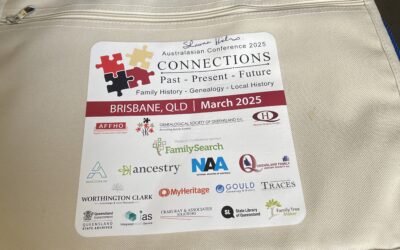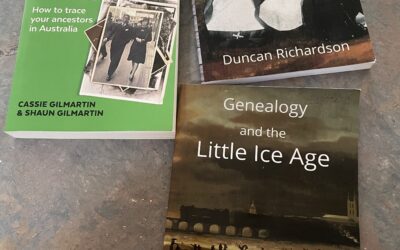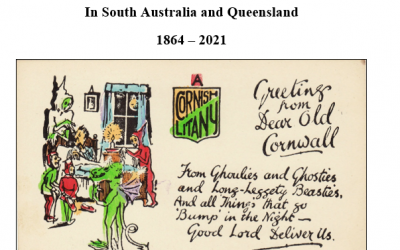This blog challenge is to stimulate my own genealogy blogging efforts in 2014 by focussing on a different kind of genealogical record each week. I wanted a challenge that reflected my own archival background as well as my own genealogy interests and there are probably lots of other records that I could have included. The challenge has an Australian focus but most of these records will be found just about anywhere in the genealogy world.
The 52 different types of genealogical records I finally decided on are listed in no particular order (each week will be a random surprise). Originally I planned to do this over 52 weeks but I now realise that I have to factor in travel and illness so it will continue a little bit over a year. Anyone is welcome to do all or part of this blogging challenge. Let me know if you are participating and I will put a link to your post under each week’s challenge.
So far I know of six bloggers who are taking up the challenge and I have put links to their individual entries at the end of each week’s blog if they have submitted something for that week. Thanks Judy Webster, Sharn White, Cassmob, Anne, Campaspe Library and Sharon for participating and encouraging me to keep up the blog challenge myself!
Also participating in this blog challenge:
Cassmob Week 11
Anne Week 11 (for finding military exemptions in newspapers)
Sharon Week 11
Links to Week 1 Military Medals Week 2 Internal Migration Week 3 Probates (wills and administrations) Week 4 Memorial Cards Week 5 Family Stories Week 6 Land RecordsWeek 7 Local Histories Week 8 Diaries Week 9 Inquest Records Week 10 Occupation Records
Week 11 Newspapers
This week’s topic is almost too easy and I could probably write pages and pages and give innumerable examples. So what I will do is highlight how digitised newspapers can lead to new discoveries about our ancestors beyond the usual births, deaths and marriages.
In Australia we are lucky that the National Library of Australia has developed Trove and this is a portal to a wide range of resources as well as digitised newspapers. It is now simply a matter of doing a keyword search on a person’s name, narrowing the results by using the decade filter and perhaps also narrowing down further to one newspaper (or any of the other filters or combinations of).
For example, by entering “John Finn” in the search field I can now easily locate the report in the Brisbane Courier on his alleged crime of arson. (Tip – the use of quotation marks keeps the two words together and reduces the number of hits). Back in the late 1980s I found John in the Brisbane prison register indexes and then had to search the newspaper on microfilm to get more details of the alleged crime. Now that the newspaper is digitised and online, I can tag the item in Trove and add it to a list of items found in newspapers that I am compiling on my Finn family.
Tagging and listing are two features within Trove that are very useful for family historians as it can help to pull all your search results on a family together. It is simple to obtain a Trove account and then you can tag, list, comment, correct newspaper text and so on. These options are available on the top left hand menu area. How can it help? Well the search for “John Finn” as well as returning hits under Newspapers, also returns a hit under Lists so anyone searching for the same name or family will be able to see my list and hopefully contact me. This can be quite useful in tracing collateral lines of families that have grown apart over the decades. If you want you can also make your lists private and then no one else will see it.
It is important to remember that not all newspapers have been digitised yet and placed online. I have a fantastic article on the alleged arson case that was published in the Sunday Truth and it even has sketches of John Finn and his daughter Mary Finn, my great grandmother. This is the only image I have of John and it is only available on microfilm at the moment. What I did not find years ago were the two reports of the case in the Queensland Times but I have now found them easily via Trove.
Papers Past is the New Zealand equivalent and again I have found useful snippets on families, usually in the police and court sections. Once you have these details of date and place you can then follow up in the Archives New Zealand to see if there is more information in the court and prison records. It does not have to be a major crime, there are lots of drunk and disorderly entries and other lesser crimes.
I have also easily found obituaries and these were hard to find on microfilm as they could appear quite some time after a death. If you are lucky an obituary may include a photograph. For example, Thomas Stephen Burstow was a former mayor of Toowoomba and a Freemason and when he died there were numerous articles in Queensland newspapers. As he was sick for some time prior to his death, the obituary appeared in the Brisbane Courier the day after his death and included a photograph of him in his Freemasonry regalia which I had not seen previously.
Newspapers also reported on local sporting and community events and you may be able to find information on your families that help to flesh out their daily lives. It can be time consuming as it is easy to be sidetracked by looking at advertisements, photographs or just reading the news of the day. On the recent Unlock the Past genealogy cruise I did a presentation about Online Newspapers and you can see the slides on the Resources page of my website. Scroll down to Presentations. There are links in the presentation to overseas historic newspapers online as well as e-resources at the National Library of Australia.
Whenever I have a few spare moments, I try and do a Trove search on one of my family lines and I am rarely disappointed. There is so much to find and as it is continually being added to, you need to remember to redo your searches from time to time. Why not do a search now and let me know any big success stories! Good luck.





I have been busy preparing for, and now participating in the A to Z blogging challenge for the month of April and I am also covering different types of family history records.
My article today is on Exemption Courts during WW1. As far as I know the only records that survive of these courts are in the newspapers. I assume other records were destroyed because the Australian government did not proceed with conscription. http://ayfamilyhistory.blogspot.com/2014/04/e-is-for-exemption-courts.html
When searching, as well as using double quotes if you add a tilde and number after the words with double quotes then you pick up if the words are together within that number of words. So for example if you search on “Plowright Avoca”~9 you will pick up all instances were the words Plowright and Avoca appear in the same article but only those instances where the words are within nine words of each other. I have found this a really useful enhancement to both my searching on Trove and on Google.
Regards
Anne
Hi Anne great to know about the exemption courts in newspapers. There are some exemption files and court registers for WW1 at Public Record Office Victoria. If you do a search for both words ‘military’ AND ‘exemption’ you will get results. Thanks Shauna